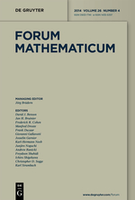
FORUM MATHEMATICUM
Scope & Guideline
Exploring the Depths of Mathematical Innovation
Introduction
Aims and Scopes
- Algebra and Number Theory:
This area includes studies on algebraic structures, representation theory, and number-theoretic functions, often exploring the relationships between different algebraic entities and their applications. - Geometry and Topology:
Research in this scope focuses on geometric structures, topological properties, and their implications in various mathematical contexts, including differential geometry and algebraic topology. - Analysis and PDEs:
The journal publishes works on real and complex analysis, functional analysis, and partial differential equations (PDEs), particularly those that involve new techniques or applications. - Mathematical Physics:
This encompasses papers that bridge mathematics and physics, particularly in areas like quantum mechanics, statistical mechanics, and the mathematical foundations of physical theories. - Combinatorics and Graph Theory:
This area explores combinatorial structures, graph properties, and their applications in optimization and computer science. - Probability and Stochastic Processes:
Research on stochastic analysis, random processes, and their applications in various fields, including finance and statistical physics. - Mathematical Logic:
This includes works on foundational aspects of mathematics, model theory, and set theory, contributing to the understanding of mathematical reasoning.
Trending and Emerging
- Nonlinear Analysis:
There is a growing interest in nonlinear equations and systems, particularly in the context of applied mathematics and engineering, leading to new methodologies and applications. - Mathematical Machine Learning:
The intersection of mathematics and machine learning is rapidly expanding, with an emphasis on developing algorithms and theoretical frameworks that support data-driven approaches. - Quantum Mathematics:
Research related to quantum theories and their mathematical foundations is trending, as the field of quantum computing and quantum information theory gains traction. - Geometric Analysis:
This area is witnessing significant growth, particularly studies that combine techniques from differential geometry with analysis to solve complex problems in mathematical physics. - Topological Data Analysis:
The application of topology in data science is emerging as a vital area of research, focusing on the shape and structure of data and its implications for understanding complex systems.
Declining or Waning
- Classical Geometry:
While still a relevant area, classical geometric studies have seen a decrease in publications compared to the rise of more abstract and algebraic geometric approaches. - Elementary Number Theory:
Research specifically in elementary approaches to number theory seems to be waning as more complex and abstract techniques gain popularity. - Traditional Combinatorial Techniques:
While combinatorial mathematics remains important, traditional methods are being overshadowed by more modern approaches that incorporate algebraic and topological perspectives.
Similar Journals

Ukrainian Mathematical Journal
Elevating Mathematical Discourse GloballyThe Ukrainian Mathematical Journal is a prominent academic publication in the field of mathematics, focusing on a diverse range of topics that appeal to researchers, professionals, and students alike. Published by Springer, this journal has been an important platform for disseminating significant mathematical research since its inception in 1957. With the aim of fostering knowledge and collaboration within the mathematical community, the journal curates high-quality articles that meet rigorous scholarly standards, evidenced by its Q3 ranking in the miscellaneous mathematics category for 2023. Although it currently does not offer open access, the journal remains accessible through various institutional subscriptions. It serves as a vital resource for ongoing discourse in the field and invites contributions that further advance mathematical understanding.
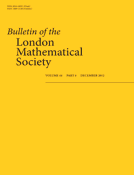
BULLETIN OF THE LONDON MATHEMATICAL SOCIETY
Illuminating Trends in Mathematics for Over Fifty YearsThe BULLETIN OF THE LONDON MATHEMATICAL SOCIETY, published by Wiley, is a distinguished journal that serves as a vital resource in the field of mathematics. With its ISSN 0024-6093 and E-ISSN 1469-2120, this journal has consistently provided a platform for innovative research and scholarly discourse since its inception in 1969. Recognized for its quality, it currently holds an impressive Q1 ranking in the mathematics category, a testament to its significance in disseminating influential findings and trends in the mathematical sciences. Researchers and practitioners can rely on the BULLETIN for its comprehensive coverage of both theoretical and applied mathematics, which caters to a diverse audience ranging from professionals to students alike. Though it does not currently offer Open Access options, its articles can be accessed through institutional subscriptions, ensuring that significant works reach the academic community effectively. With contributions that span over five decades, the journal continues to shape mathematical research and inspire future advancements in the discipline.

Analele Stiintifice ale Universitatii Ovidius Constanta-Seria Matematica
Exploring the Depths of Analysis and Applied MathematicsAnalele Stiintifice ale Universitatii Ovidius Constanta-Seria Matematica is a prominent open-access journal established by OVIDIUS UNIV PRESS in Romania, dedicated to advancing the fields of mathematics, specifically in Analysis and Applied Mathematics. Since its inception, the journal has emphasized the dissemination of high-quality research, making it accessible to a global audience. With an ISSN of 1224-1784 and E-ISSN 1844-0835, it has positioned itself within the academic community, achieving a respectable Q3 ranking in both analysis and applied mathematics in 2023, reflecting its commitment to rigorous scholarship. The journal spans a considerable publication window from 2009 to 2024, catering to the ongoing developments in mathematical sciences and their applications. Researchers, professionals, and students alike will find valuable insights and contributions that enrich their understanding and foster collaboration within the mathematical community. The journal's headquarters is based at the Faculty of Mathematics & Computer Science, Bulevardul Mamaia 124, Constanta, Romania.
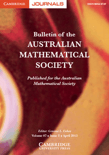
BULLETIN OF THE AUSTRALIAN MATHEMATICAL SOCIETY
Showcasing Pivotal Research for a Brighter Mathematical FutureBULLETIN OF THE AUSTRALIAN MATHEMATICAL SOCIETY is an esteemed journal dedicated to advancing the field of mathematics, published by Cambridge University Press. Since its inception in 1969, this periodical has fostered scholarly communication and showcased pivotal research in various domains of mathematics, now projected to continue until 2024. With an impact factor that places it in the Q2 category of miscellaneous mathematics research, it holds a notable position among its peers, ranking 215th out of 399 in the Scopus database. Though it does not currently offer open access options, the journal remains a vital resource for researchers, professionals, and students seeking to deepen their understanding of mathematical advancements. The Bulletin serves as a crucial platform for disseminating original research, comprehensive reviews, and insightful perspectives that navigate the complexities of mathematics today, ensuring the community is well-informed and engaged.
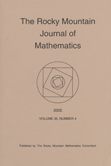
ROCKY MOUNTAIN JOURNAL OF MATHEMATICS
Pioneering Research for a Dynamic Mathematical CommunityROCKY MOUNTAIN JOURNAL OF MATHEMATICS, published by the Rocky Mountain Math Consortium, serves as a critical platform for researchers and practitioners in the field of mathematics since its inception in 1971. With a notable presence in the academic community, this journal covers a broad spectrum of mathematical disciplines, positioning itself in the Q2 category for Mathematics (miscellaneous) as of 2023. Despite being a subscription-based journal, it is recognized for its rigorous peer-review process and contributions to theoretical and applied mathematics, helping to advance knowledge and foster collaboration among mathematicians. The journal's ISSN number is 0035-7596 and its E-ISSN is 1945-3795, reflecting its commitment to accessibility and dissemination of high-quality research. Based in Tempe, Arizona, at Arizona State University, the journal continues to play an important role in shaping contemporary mathematical discourse through well-researched articles and innovative studies, aiming to bridge gaps between various mathematical subfields and engage a diverse audience, including students and established researchers alike.
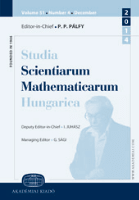
STUDIA SCIENTIARUM MATHEMATICARUM HUNGARICA
Connecting Ideas, Cultivating MathematicsSTUDIA SCIENTIARUM MATHEMATICARUM HUNGARICA is a distinguished journal published by AKADEMIAI KIADO ZRT, focusing on the vast field of mathematics, specifically categorized under general mathematics. With its ISSN 0081-6906 and E-ISSN 1588-2896, this journal has been a critical platform for mathematicians, researchers, and educators since its inception in 1996, continuously evolving through to 2024. Based in Hungary, it holds an impact factor that positions it in the 3rd quartile for mathematics in the 2023 rankings, reflecting its contribution to academic discourse within the discipline. Though not an open-access journal, STUDIA SCIENTIARUM MATHEMATICARUM HUNGARICA serves as an important repository of innovative research findings and methodologies, making it a vital resource for professionals and students striving to stay ahead in the rapidly advancing world of mathematics. The journal's commitment to quality and rigor enhances its relevance, evidenced by its Scopus rank in the 51st percentile overall in the general mathematics category.
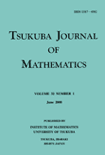
Tsukuba Journal of Mathematics
Empowering Mathematicians to Share Transformative IdeasTsukuba Journal of Mathematics is a distinguished publication dedicated to advancing the field of mathematics through the dissemination of innovative research and comprehensive studies. Published by the University of Tsukuba, Department of Mathematics, this journal serves as a vital platform for mathematicians, researchers, and students to engage with cutting-edge mathematical theories and methodologies. Although currently not available as an open-access journal, it maintains a strong academic presence, contributing significantly to the global mathematical landscape. The journal invites submissions across various branches of mathematics, aiming to foster scholarly communication and collaboration. The ISSN 0387-4982 and the E-ISSN 2423-821X further establish its credibility and accessibility among the academic community, supporting its critical objective of facilitating high-quality research output. Situated in Tsukuba, Japan, a hub for scientific research and development, the Tsukuba Journal of Mathematics is committed to bridging gaps in mathematical knowledge and encouraging exploration of novel ideas.
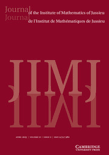
Journal of the Institute of Mathematics of Jussieu
Pioneering Research in the Heart of MathematicsJournal of the Institute of Mathematics of Jussieu, published by Cambridge University Press, is a leading academic journal that has established itself as a vital resource in the field of mathematics. With an impressive impact factor and a ranking in the top quartile (Q1) of miscellaneous mathematics, the journal serves as a platform for high-quality research from both established scholars and emerging researchers. Spanning from 2002 to 2024, the journal aims to foster collaboration and innovation in the mathematical community by publishing original research articles, reviews, and critical discussions on a wide range of mathematical topics. Although the journal does not offer open access, it remains widely accessible through various academic institutions and libraries, ensuring that critical advancements in mathematics are shared with a global audience. Located in the United Kingdom at the prestigious Cambridge campus, the journal reflects the rigorous standards of its publisher and the rich academic tradition of its home institution.
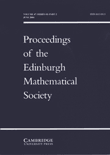
PROCEEDINGS OF THE EDINBURGH MATHEMATICAL SOCIETY
Advancing mathematical frontiers since 1883.PROCEEDINGS OF THE EDINBURGH MATHEMATICAL SOCIETY, published by Cambridge University Press, stands as a cornerstone within the realm of mathematical research, providing a platform for original papers that push the boundaries of various mathematical disciplines. With a rich history dating back to 1883, this journal has evolved through several converged years, reflecting the dynamic nature of mathematical inquiry. As a Q2 category journal in the field of Mathematics (miscellaneous) according to the latest rankings, it situates itself within the upper tier of academic publications, offering an essential resource for researchers and professionals alike. While it currently does not offer open access options, the journal's contributions are invaluable, facilitating dialogue and collaboration among scholars. The journal's commitment to advancing mathematical knowledge makes it a vital publication for those engaged in the study and application of mathematical theories and principles.

INDIANA UNIVERSITY MATHEMATICS JOURNAL
Advancing Mathematical FrontiersINDIANA UNIVERSITY MATHEMATICS JOURNAL is a prominent scholarly publication dedicated to the field of mathematics, characterized by its commitment to advancing academic discourse and research. Published by Indiana University, this journal provides a platform for the dissemination of original research, including innovative theories and methodologies in various areas of mathematics. With an esteemed impact factor placing it in the Q1 category for miscellaneous mathematics and a Scopus rank of #106 out of 399, this journal is recognized for its rigorous peer-review process and high-quality contributions, appealing exclusively to researchers, professionals, and students seeking to expand their knowledge. Although it currently does not offer open access, its extensive archive ranging from 1970 to the present allows for a rich exploration of past and current mathematical explorations. For those looking to stay at the forefront of mathematical research, INDIANA UNIVERSITY MATHEMATICS JOURNAL remains an essential resource in the academic landscape.